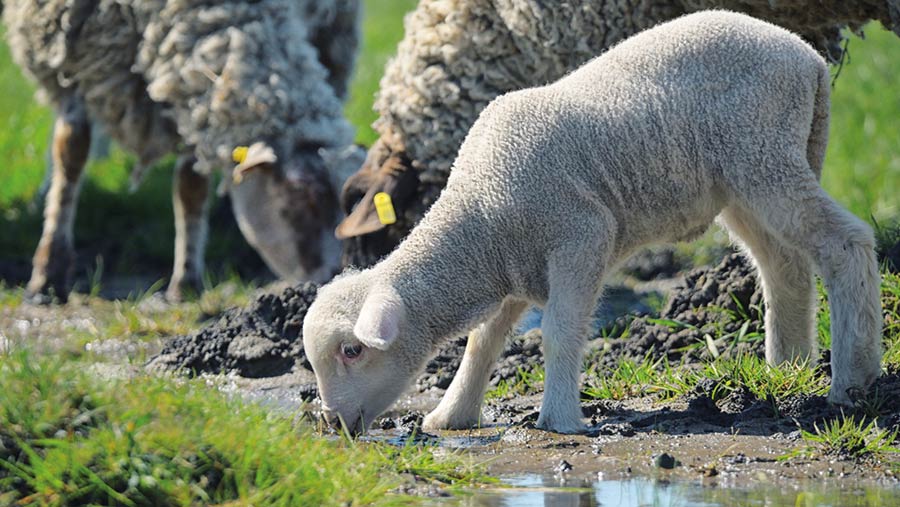Is cryptosporidiosis affecting your lamb performance?
 © Pixabay
© Pixabay Cryptosporidiosis is a parasitic infection affecting sheep that can restrict growth and increase finishing times, despite typically only affecting lambs in their first 10 days of life.
It often falls under the radar and, as a result, its effect on lamb performance can be underestimated.
John Hemingway, veterinary surgeon at Shropshire Farm Vets, outlines symptoms farmers should look out for, how to avoid outbreaks and what can be done to control cryptosporidiosis.
See also: Step-by-step guide to foot-bathing sheep
How is infection spread?
It infects animals when they ingest the micro-organism Cryptosporidium parvum, a type of parasitic protozoan.
Unlike many other protozoan parasites, cryptosporidium does not need to leave the body to complete its reproductive cycle, which means infections can escalate very quickly.
The disease oocysts are shed in the faeces of infected animals, which can then be picked up by other stock. It is commonly problematic when sheep and cattle are housed.
Ewes don’t often present symptoms of cryptosporidiosis, but they can still shed the disease. Young animals that are more vulnerable to the parasite can easily pick it up from the environment.
Cattle and sheep can also get infected by drinking from watercourses, where the parasite thrives.
It’s important to prevent livestock getting into rivers and brooks to avoid their faeces contaminating the water, harming water quality.
Cryptosporidiosis can spread across species, transferring from calves to sheep and vice versa.
It is a zoonotic disease, so it can also be picked up by humans. Staff hygiene is paramount to avoid humans contracting this disease when handling livestock.
What are the symptoms?
Identifying cryptosporidiosis in livestock can be difficult, as many of the symptoms are similar to E coli.
The most common symptom is a profuse yellow scour, with initial bloating of the stomach developing to a hunched-up appearance and rapid weight loss.
Lambs affected with cryptosporidiosis are often simultaneously infected with E coli (watery mouth).
Effect on performance
Cryptosporidiosis is an economically significant disease. Even though it typically affects lambs within the first few days of life, it can have long-term effects on their performance.
The parasite reduces early growth rates and stunts the development of organs important for onward growth, such as the liver.
Animals affected in the first week of life will suffer from knock-on effects through to weaning, and often beyond. In severe cases it can result in mortality in young lambs.
How is it controlled?
There are no specific treatment measures to control cryptosporidiosis in sheep.
It’s important that producers maintain excellent hygiene and biosecurity, especially if there are calves on site, as the parasite is adept at surviving in the environment, increasing the risk of spread to other species.
There are several steps farmers can take:
- All infected stock should be isolated and the areas where they were originally housed should be disinfected and left to dry
- When lambing indoors, producers should steam-clean and disinfect the shed with peroxide before housing. Cleaning out pens and allowing them to dry between animals is also recommended to avoid the spread of the disease
- Watercourses should be fenced off from livestock, and water provided instead from a clean water tank installed on hard standing.
Ensuring every lamb receives adequate colostrum within the first 24 hours of life is also key, as this provides them with antibodies to fight off disease.
In addition, sick lambs should be given a rehydration drink to keep their fluid and electrolyte levels up.
John Hemingway joined Shropshire Farm Vets in January 2016. He has a keen interest in parasitology, particularly in sheep, and enjoys working with shepherds on a flock level to enhance their production and profitability.
Funding to protect watercourses and livestock
Farmers within Severn Trent groundwater catchments with cryptosporidium targets can apply for the Severn Trent Environmental Protection Scheme (Steps) grant, which offers up to £10,000 of match-funding to help prevent the risk of cryptosporidium parasites getting into watercourses and reduce the spread of the disease in livestock.
“We offer support with livestock fencing, installing drinking troughs on hard standing and pumping water away from watercourses to troughs on drier land,” says Cath Edwards, Severn Trent agricultural adviser.
In extremely high-risk areas, producers can be paid to not graze the land to help mitigate the risks of animals drinking directly from watercourses, and water, which may contain faeces, running off steep fields.
“A Steps grant will help improve animal health and performance and protect water quality and the environment,” adds Mrs Edwards.
The Farming for Water initiative is a key priority for Severn Trent. Working closely with farmers and landowners, it provides support and funding to help reduce pollution, protect the environment and improve water quality.
Steps applications are open until 31 January 2022. For more information and the full eligibility criteria, visit the Severn Trent website or contact your local Severn Trent agricultural adviser for support with the application.
